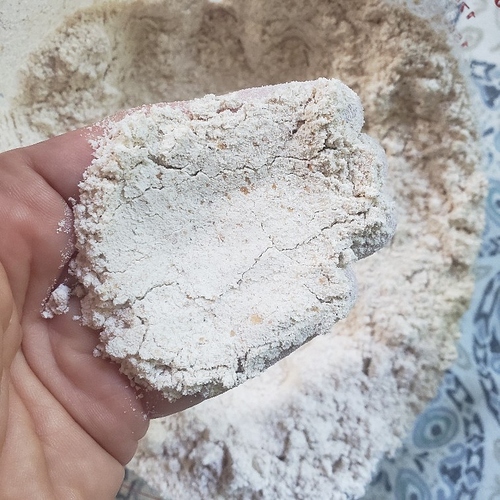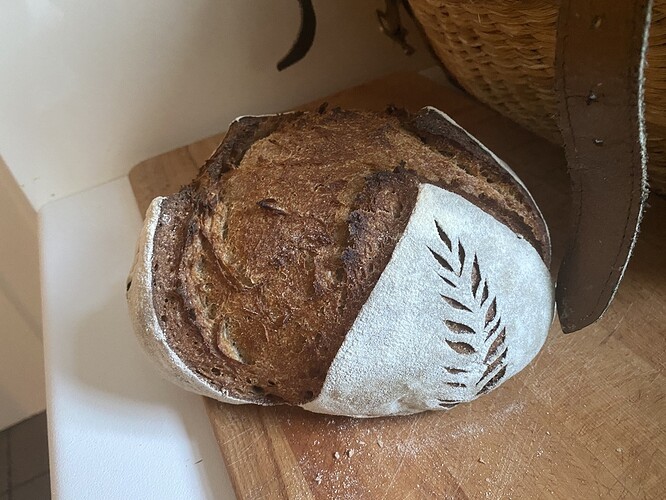Thanks Abe!
Hello!
Has anyone had made this recipe for 100% whole grain spelt sourdough with fresh-milled flour? If so, how fine did you grind it? Did you use the flour unsifted? Did you have to reduce the water even more?
I have successfully made spelt/white flour sourdough for a few months now with purchased whole-grain spelt flour and a 71% hydration recipe. I finally got my Nutrimill Plus and spelt berries, as I want very much to bake fresh-milled, whole grain sourdoughs for my family. I produced my first two large bread-bricks last week  , and want to start over with this recipe. Any help or tips will be much appreciated!
, and want to start over with this recipe. Any help or tips will be much appreciated!
Yes, I’ve made the recipe with home-milled spelt many times. I mill the spelt as finely as possible and I don’t sift out any of the bran. Enjoy!
Thank you!
Any tips on milling spelt with a Mockmill Pro 100 so that the bran isn’t so big? I find bran bigger with spelt than any other grain!
Stones knocking, pour in the berries, then nudge the dial a little tighter. That’s all I’ve got  apart from sift and re-mill the bran, or sift and soak the bran in boiling water.
apart from sift and re-mill the bran, or sift and soak the bran in boiling water.
Thanks, Melissa. I’ve had a couple of bad experiences when trying to mill a grain too fine, noticing that the flour stopped coming out (good thing I was standing right there) and the stones got clogged. I had to take the whole thing apart. I’m guessing I just went too far, the stones were too close together. I think I need to keep trying until I know the exact spot for what works. Once for spelt I did sift out the bran and mill it on its own, putting spoonfuls in at a time to make sure it went through. Sort of a pain… But it did break it down.
I clogged the stones a couple times too. Was a big pain cleaning them (if they spin at all, running some minute rice through the mill with it first set fairly coarse, and then again relatively fine can sometimes totally clean it up without having to take it apart).
I don’t know how to describe exactly how tight you can make the stones without clogging. It’s a different degree depending on what grain you are milling and how much moisture is in the grain. But I have been milling very fine for a couple years now without clogging and I believe that the “secret” is just really paying attention to the flow of flour coming out of the spout. It should be coming out slowly but steadily. If it starts to sputter or stall you have to back the stones off a tiny bit. And when you have them pressed together far enough to get really fine flour, the difference between too tight and just right is a pretty small adjustment.
Like Melissa said, I start the mill with the stones just barely not touching each other. Then I pour in the grains and immediately adjust the stones a fair bit tighter than where they would be grinding against each other if the mill were empty. Having grain in between keeps them from grinding against each other and produces the finer flour. After doing this many times, I know just about how much to adjust the stones, but I am still paying close attention during that initial adjustment to the flow of flour coming out of the spout and I fine-tune the pressure so I see what seems to me like the right rate of flow.
Trial and error and experience. Worth it to me to get fine flour in one pass from the mockmill. None of this is specific to spelt.
I probably need to run rice through my mill. I’ve clogged it a few times recently remilling warm corn flour at a tight setting. Both times I was able to back off the stones a lot, start things up again, and then retighten but less than before. My stones are probably a little glazed though 
I milled a combo of warthog and spelt this morning. I should have done them separately for comparison, but my recollection is warthog has bigger flakes. Here’s both of them together fwiw 
Can someone please help? i’ve been baking sourdough for quite some time. But leaving the dough out overnight seems kind of crazy to me. It seems like it could DRASTICALLY overproof particularly where I live in Texas. Is this a viable option in warmer climates? With typical sourdough, the bulk fermentation (including stretch and folds) for me is between 4.5-6 hours with an overnight retard in the fridge. If I leave this loaf out overnight that’s like a 14 hour bulk ferment. How is the fermentation phase so drastically different? My house is probably 76 degrees at night.
My recommendation is to ignore anything you read in a sourdough recipe about length of proofing time. If you know that in your house, with your starter, that a typical bulk proof is going to take 4.5 - 6 hours, then go with that and ignore whatever it says in the recipe.
Paul and Melissa, thank you for your feedback. I will definitely start watching the flow of flour for signs of stones being too close. I’ve had the mill for 9 months and am much better at understanding it now than back then, but I still have a way to go.
I don’t think you will see this soon enough to get back to me in time, but I’m posing the question anyway:
How long does the dough need to be refrigerated? Could just a few hours be long enough? I would really like to bake it tonight, before bed.
I used my new MockMill to grind my spelt but I cheated and used some gluten flour. Consequently the dough is very well behaved and I might even try scoring it before baking.
An infinite combination of proofing combinations are valid: room temp, refrigerator, and even freezer.
If I wanted a shorter final proof but a cold dough, I might do all the final proof at room temp except for the final 20 minutes in the freezer to stiffen up the dough.
Or just all at room temp. The amount of time that “all” is has to be determined by what the dough looks/feels like, but 45min to 3hrs is a typical range.
Love this recipe. Noticed that the spelt recipe in the book doesn’t have any honey or sugar… Hesitant to try!
Definitely add honey if it’s what you’re used to! I’ve done it both ways and it works well. I do often work with sprouted spelt, and there’s an added sweetness and speed of fermentation in that case.
I baked the spelt bread for the first time and it turned out great! But believe I like the Artisan Sourdough recipe better. I love whole grains, hate white bread. Used 2T of agave (which I often use in many ways). But did not like the sweetness it imparted. Next time, I will leave it out. I believe I like the Artisan Sourdough recipe better,
Best spelt recipe ever! Greek organic honey gives it amazing taste and aroma, amazing crust great crumb!

